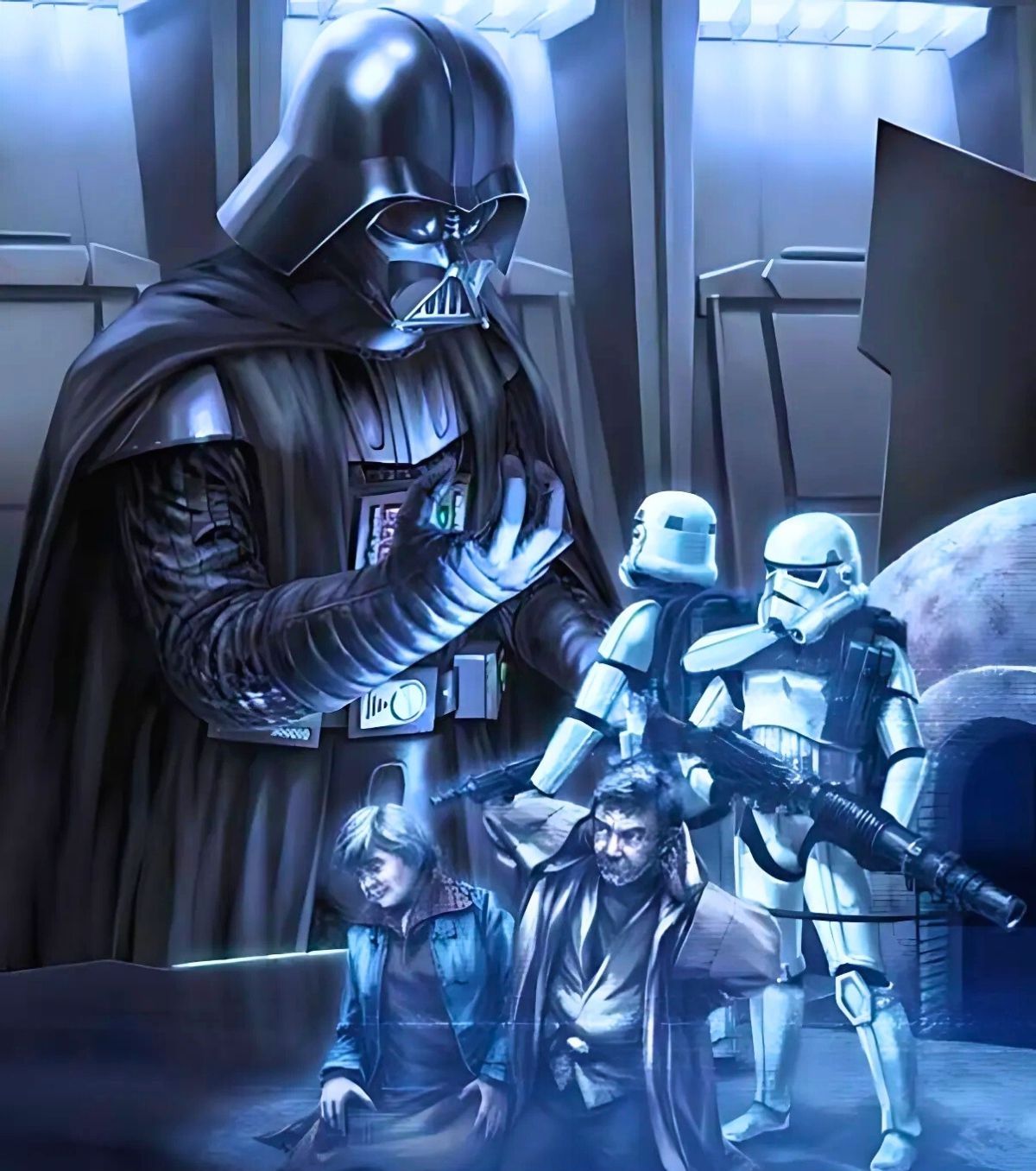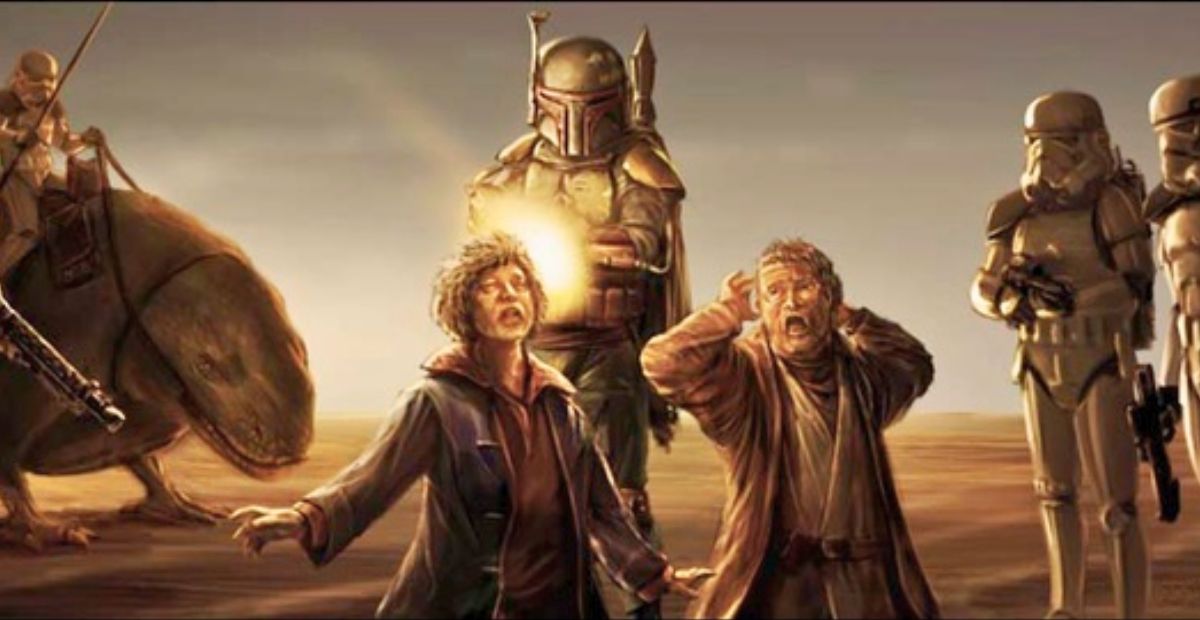We all know the story. Luke Skywalker comes home to find the Lars homestead burning, with the charred remains of Uncle Owen and Aunt Beru left behind—an image that stuck with every Star Wars fan forever. Officially, it was stormtroopers who did it, tracking the stolen Death Star plans back to Tatooine. But if you take a closer look… something doesn’t quite add up.
Stormtroopers are brutal, sure, but they’re not usually this personal. The bodies weren’t just shot—they were burned to the bone. It felt like a message, not a routine search.
That’s where the theory comes in: What if Boba Fett was involved?
Boba Fett Was Active Around This Time—And He Had Ties to the Empire
Before we make any bold assumptions, we should rewind the scene a little bit. As we know, the Empire sent sandtroopers down to Tatooine to track the stolen Death Star plans carried by the droids. However, the sandtroopers were standard infantry—armed with blasters, not flamethrowers. They were there to recover stolen data, not to torch civilians. And the only type of Imperial troopers known to carry flamethrowers were the specialized flametrooper units, which weren’t seen anywhere near Tatooine during this time.
And here’s where it gets suspicious.
So when Luke returns to the Lars homestead and finds the bodies of Owen and Beru completely burned, it raises questions. That kind of destruction doesn’t line up with typical stormtrooper behavior. It wasn’t a simple search-and-destroy mission—it felt more like an execution made to send a brutal message.
Now, if we look at the Obi-Wan Kenobi series, we see that Owen and Beru aren’t just passive moisture farmers. They’re willing to stand and fight to protect Luke. If sandtroopers had approached, they would’ve fought back—but the result would’ve likely been a quick shootout. The Empire wouldn’t waste time or resources burning the place down unless it was intentional.
However, when we consider someone like Boba Fett—a ruthless bounty hunter known for his efficiency and brutal methods—it starts to make more sense. Boba Fett, like most Mandalorians, was equipped with a flamethrower as part of his arsenal. Flamethrowers are standard in Mandalorian gauntlets, and Fett was no exception. If the Empire sent Fett to follow the trail of R2-D2 and C-3PO, and he tracked them to the Lars homestead, he wouldn’t hesitate to act. And if Owen and Beru tried to protect their home—or even stall for time—Fett could’ve used force to make a brutal example out of them. It would also explain the burn marks. The bodies weren’t blasted, they were incinerated. That’s a message, not an accident.
There’s also something subtle but telling in The Empire Strikes Back. When Vader is briefing the bounty hunters—including Fett—he singles him out with a very specific warning: “No disintegrations.” That line only makes sense if Fett has a history of going too far. Vader knew what Fett could do and didn’t want a repeat. It’s possible that back during the events of A New Hope, Fett was already working for the Empire—sent ahead to retrieve the droids discreetly. And maybe he left the Lars homestead in flames when things didn’t go his way.
Fett Regrets Killing Owen and Beru (The Book of Boba Fett Theory)

This theory builds off the idea that Boba Fett was involved in the destruction of the Lars homestead—but instead of focusing on proving the act, it shifts the attention to how he might feel about it now. It’s not about catching him red-handed, but about reading into his emotional reaction and how that moment might have stuck with him.
In the premiere episode of The Book of Boba Fett, Boba is still a prisoner of the Tusken Raiders. A young Tusken takes him and another prisoner—a Rodian—to a small homestead in the desert. There, they witness a group of raiders trashing the place and leaving it burning. The homestead is eerily similar in appearance to Owen and Beru’s in A New Hope, and it’s shown in the same scorched, smoking condition that Luke finds in the original film.

Boba doesn’t say anything, but the camera lingers on his face. Temuera Morrison gives a subtle but powerful expression—his eyes drop, his mouth tightens, and he looks away. It’s not the look of someone who’s just curious or surprised. It reads more like guilt, as if this is a scene he’s seen before—and one that still haunts him.
In Star Wars Legends, Vader Ordered the Lars Homestead Burned

In canon, we might only have theories, like the idea that Boba Fett burned down the Lars homestead. But in Star Wars Legends, there’s a much clearer and more brutal answer.
In the novel The Rise and Fall of Darth Vader, we actually see the moment it all happens. After learning that the droids from the Tantive IV had landed on Tatooine, Vader receives a live transmission from Imperial sandtroopers. He sees two people kneeling in the sand — Owen and Beru Lars — with blasters aimed at their backs. He recognizes them immediately. The same people who once raised the boy he used to be.
He remembers them from his past life as Anakin Skywalker, and the moment triggers something dark. He doesn’t hesitate. Instead, he coldly tells the troopers, “Tell Mr. and Mrs. Lars that they seem to have trouble keeping protocol droids on their property,” before ordering them to treat the couple the same way they treated the Jawas earlier… meaning execution.
Then comes the chilling part.
Vader instructs, “Do not stop transmitting until I break the connection.” And as the homestead is engulfed in flames, “Vader watched the sandtroopers carry out his orders on their helpless victims. He found the sight of rising flames—even holograms of flames burning millions of light years away—to be most satisfying.”

